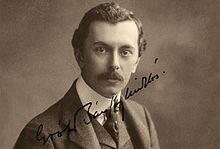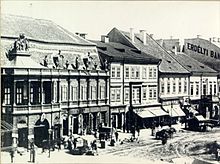Miklós Bánffy
Count Miklós Bánffy von Losoncz (born December 30, 1873 in Kolozsvár , then Kingdom of Hungary, † June 5, 1950 in Budapest ) was a Hungarian landowner, politician and author of historical novels.
Life
Bánffy came from a large Hungarian landowning family in Transylvania , who had had the title of count since 1855. The family owned the Bánffy Castle in Bonchida / Bonțida . He studied law and became a member of the Hungarian Parliament in 1901. From 1906 to 1909 he was prefect in Cluj County . He was one of the editors of the conservative magazine "Erdélyi Lapok" and was director of the Budapest Opera and the National Theater from 1912 to 1918, where he was one of the sponsors of the performance of Béla Bartók's music .
After the First World War lost for Hungary , Transylvania was added to the Treaty of Trianon Romania, whose revision Bánffy operated from Hungary. For example, he was Foreign Minister in the István Bethlen cabinet in Hungary under the Reich Administrator Miklós Horthy from April 14, 1921 to December 29, 1922 . In order not to lose his property in Romania, he had to opt for Romanian citizenship in 1926 and take up residence in Romania. In addition to journalistic work, he had published his first stage work in 1913. In the 1930s he wrote a three-part contemporary novel about the situation in his home region before the First World War, the first part of the trilogy appeared in Budapest in 1934, the last in 1940. Bánffy wrote for the literary magazine "Erdélyi Helikon" and was its editor-in-chief.
Due to the Second Vienna Arbitration , the northern part of Transylvania became Hungarian again in 1940, for which Bánffy had agitated. In April 1943, Bánffy tried in Bucharest to bring together the Romanian and Hungarian efforts to leave the Axis powers , but these negotiations failed because of the mutual claims to territory.
When Hungary was conquered by the Soviet troops in 1944, his wife and daughter fled to Budapest, while Bánffy stayed on his property in Transylvania, which has now been reintegrated into Romania. He was expropriated there and was able to emigrate to Hungary in 1949.
Fonts
- A nagyúr , drama, 1913.
- Reggeltől-estig , Roman, Kolozsvár, 1927.
- Martinovics , Drama, Kolozsvár, 1931.
- Fortéjos Deák Boldizsár memoriáléja , Kolozsvár, 1931.
- Emlékeimből , Kolozsvár, 1932.
-
Transylvania Trilogy :
- Megszámláltattál , Roman, Budapest, 1935. ( The writing in flames , translated from the Hungarian by Andreas Oplatka, Paul Zsolnay Verlag, Vienna 2012, ISBN 978-3-552-05559-9 )
- És híjjával találtattál , Roman, Budapest, 1937. ( Disappeared Treasures from Hungarian by Andreas Oplatka, Paul Zsolnay Verlag, Vienna 2013, ISBN 978-3-552-05596-4 )
- Darabokra szaggattatol , Roman, Budapest, 1940. ( Torn to pieces from the Hungarian by Andreas Oplatka, Paul Zsolnay Verlag, Vienna 2015, ISBN 978-3-552-05633-6 )
literature
- Péter Takács: Bánffy Miklós világa , Budapest Felelős Kiadó 2006
Footnotes
- ↑ Ulrich Baron: When the ice needles melt. "Torn to pieces" - the final volume of the great Transylvania trilogy by Miklós Bánffy leads to the First World War . In: Süddeutsche Zeitung of May 12, 2015, p. 12.
Web links
- Literature by and about Miklós Bánffy in the catalog of the German National Library
- Short biography and reviews of works by Miklos Banffy at perlentaucher.de
- Bánffy at Hunlit (en)
| personal data | |
|---|---|
| SURNAME | Bánffy, Miklós |
| ALTERNATIVE NAMES | Banffy, Miklos |
| BRIEF DESCRIPTION | Hungarian landowner, politician and author |
| DATE OF BIRTH | December 30, 1873 |
| PLACE OF BIRTH | Kolozsvár , Austria-Hungary |
| DATE OF DEATH | June 5th 1950 |
| Place of death | Budapest |



